In 2015, the city council of Fayetteville, Arkansas, adopted a radical but simple idea: do away with minimum parking mandates and let businesses decide for themselves how much parking they need.
The average person walking down the main drag of Dickson Street might be surprised to learn that this growing city of 94,000 was perhaps the first city in the nation to eliminate commercial parking minimums citywide. Striking the section of zoning code that detailed how many parking spots each business was required to provide created new opportunities for local entrepreneurs. The ordinance, which left maximum parking ratios in place, did not spur a frenzy of redevelopment, nor did it bring a malady of parking complaints and plummeting home values, as the city attorney had warned.
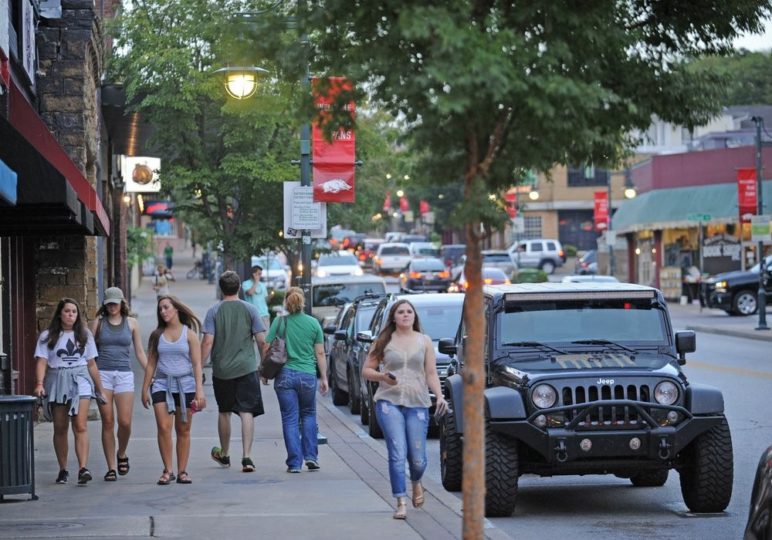
Dickson Street is referred to as the heartbeat of Fayetteville. Photo by Andy Shupe, Arkansas Democrat Gazette. Used with permission.
“Our experiences have been somewhat anti-climactic,” city planner Quin Thompson said.
Parking requirements discouraged new possibilities
Thompson built the case to remove parking minimums after several years on the job. “As a city planner, you receive phone calls [from Realtors and potential investors] about what’s possible with this property or this potential piece of property,” he said.
He began to see a pattern in the same properties over and over again. Something in the city rules seemed to be keeping those buildings empty—and preventing anyone’s new ideas from taking root.
These commercial buildings that sat vacant for years had a similar profile: older buildings on smaller lots, often near downtown. In one case after another, it turned out that the key issue was parking—specifically the minimum number of parking spots required. It was possible for a property owner to get planning permission to reduce the amount of parking required, but people seldom tried.
Code change spurs growth
Now, six years after the mandates were lifted, those addresses have rejoined Fayetteville’s thriving economy.
“The buildings I had identified as being perpetually and perhaps permanently unusable were very quickly purchased, redeveloped, and are in use right now,” Thompson said.
One of those places is 110 South College Avenue. Fayetteville resident Lewis Chase convinced his childhood friends, chefs and brothers Michael and Matthew Sutton, to come back home to start their own restaurant. After two potential properties fell through, the trio came across a vacant building downtown. It was in bad shape, having been unoccupied for nearly 40 years, but then they climbed onto the roof and saw the view. There were only five parking spots on site, 30 short of what the previous parking code would have required.
Disaster? Nope. Despite losing two nearby parking lots that customers could use since they signed the lease, customers keep showing up.
“It hasn’t killed our business, that’s for sure,” Chase said. Now the partners are planning to open a second restaurant on the north side of town.
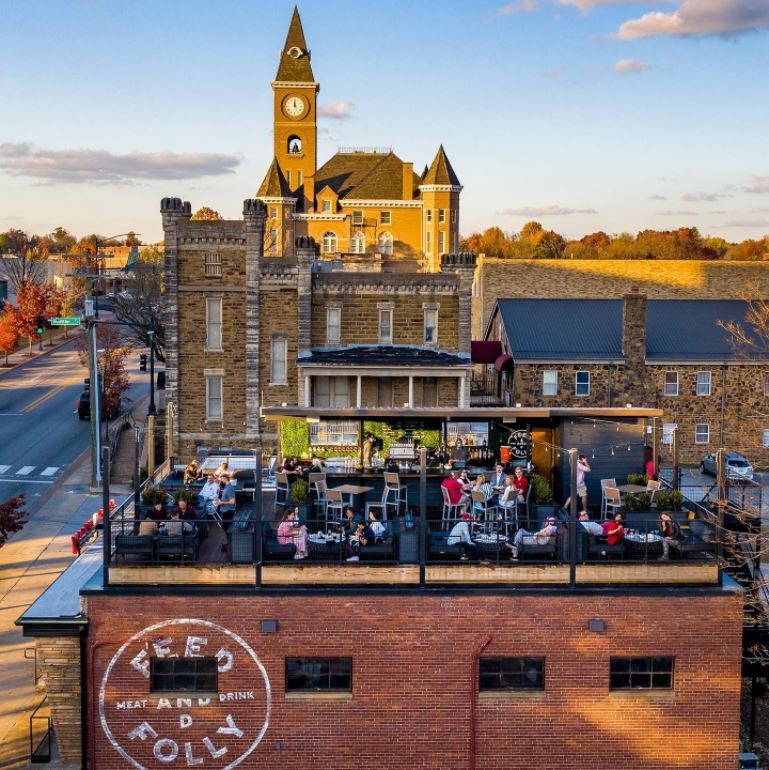
This downtown property had sat vacant since 1972, until it was renovated and reopened as a restaurant in 2020. Image by Feed and Folly.
Ending parking requirements citywide
It’s common for towns to exempt historic downtown areas from parking requirements in order to preserve the aesthetics and walkability of cherished main streets that were built before parking mandates. But when Thompson sat down with Fayetteville’s planning director to establish a boundary, they struggled to define an edge that seemed fair.
“Some of these properties were downtown, but a lot weren’t,” Thompson said. Eventually they gave up on drawing lines, agreeing that everyone deserved the same opportunity. Brandon Rostek, one of the owners of two-year-old Atlas the Restaurant, is a fan.
“It’s nice to have more space for more local businesses to open up,” Rostek said. “The more businesses that are centrally located and closer together, the better it is for everyone when you have more foot traffic.”
Atlas the Restaurant is the first venture in the newly renovated Ellis Building, which dates to 1923 and is on the National Register of Historic Places. The restaurant’s off-street space is reserved for a handful of employee vehicles. Before 2015 a restaurant of that size would have required 41 spaces.

Brandon Rostek, General Manager and co-owner of Atlas the Restaurant. Image by Atlas the Restaurant. Used with permission.
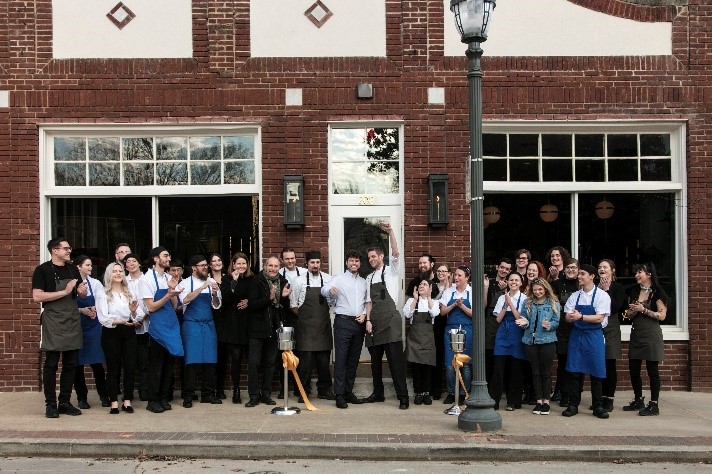
The Ellis Building transformed into Atlas the Restaurant. Image by Atlas the Restaurant. Used with permission.
Benefiting the old and the new
Renovated buildings are not the only ones benefitting from the change. Former Alderman Matthew Petty, who championed the ordinance on city council, recently converted a vacant lot into nine apartments, two offices, a smoothie shop, and a taproom.
“We were only able to pull it off because the commercial parking minimums were in play,” Petty said about the site, which was only 50 feet deep. He said that technically the code’s fine print may have allowed them to pursue a variance to count off-site parking toward the requirement, but it’s a risky endeavor that would have made the project vulnerable to be appealed to city council.
“It’s so incredibly inconvenient,” he said, “[that] we would have ruled out that site for what we wanted to do.”
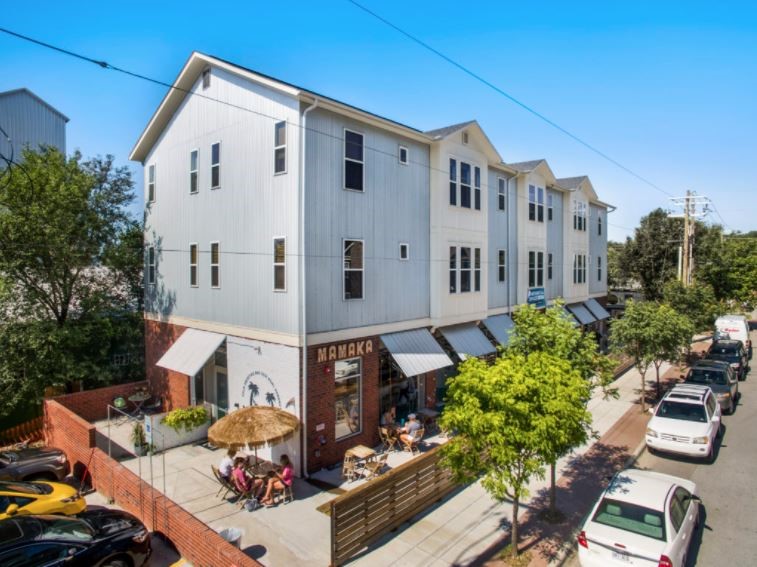
A vacant lot transformed into a mixed-use building with nine apartments, two offices, a smoothie bar, and a taproom. Image by Joshua Duke Photography. Used with permission.
Opening options for entrepreneurs
Several Fayetteville businesses owners supported eliminating the parking requirements but were skeptical the old rules would have even applied to them. (They would have.) Petty thinks that’s a win.
“That’s how you know good public policies,” he said, “when years later people completely take it for granted.”
And that’s kind of the point. Business owners shouldn’t have to be experts in parking regulations to decide if a site will work for them. Given the option of where to invest their savings, different business owners might prioritize a great view or an ideal location over abundant parking, if cities would allow them to. In the City of Fayetteville, that future has already arrived.


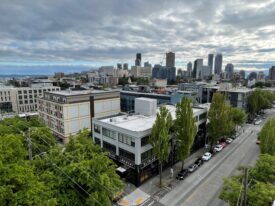

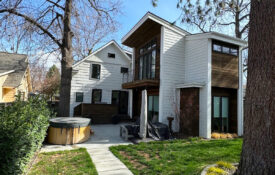

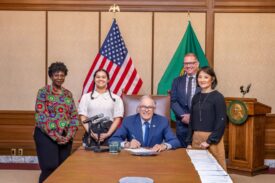

Daniel
Reading this article after seeing the youtube video put together by StrongTowns, I don’t see any comments even mentions of abolishing *residential* parking minimums. After success with removing the commercial MPR mandate, it would be great to hear a push to improve access to housing through removing residential MPR.